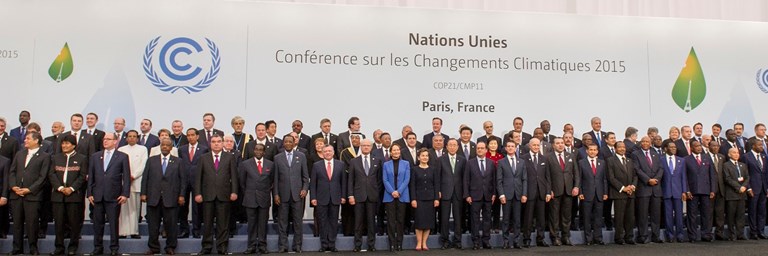Major New Climate Action Initiatives Over 150 Leaders Back Drive for New Agreement in Paris

The UN chief said that this was a good start but that it was necessary to go much farther and much faster, if the global temperature rise was to be limited to below 2 degrees, beyond which climate impacts become more and more unmanageable.
French Foreign Minister Laurent Fabius, who also holds the Presidency of COP 21, stressed the human face of climate change, recalling his encounters with people around the world directly affected by climate impacts. Hundreds of millions of people depended directly on the solutions to climate change that delegates will reach at this conference, he said.
For full statements made by the French President, the UN Secretary General and the French Foreign Minister please see here.
For full statements made at the Leaders Event, please see here.
High-Level Events Drive Climate Action Forward
Many heads of state and government also took part in a series of high-level events during the day to announce strong commitments and launch new initiatives to drive climarte action forward further and faster. The initiatives gather coalitions and parternships from all levels of government, internaiotnal organisations business, finance and civil society, reflecting the fact that dealing with climate change is a global challenge that crosses not only borders but involves every part of society and economy.
An Energy Transformation
In renewable energy, India and France have launched the International Solar Energy Alliance to boost solar in developing countries. The initiative includes 120 countries with joint efforts to mobilize over one trillion dollars by 2030 for the massive deployment of affordable solar energy.
Twenty countries, all major economies, and a private sector initiative spearheaded by Bill gates put innovation under the radar. They launched Mission Innovation to double their current investments in the sector to US$20 billion over five years. They want to dramatically accelerate public and private global clean energy innovation.
Six heads of State and Government, plus the World Bank and the International Monetary Fund called on companies and countries to put a price on carbon. Countries involved in making the call are Canada, Chile, Ethiopia, France, Germany and Mexico.
The World Bank has announced a US$500 million initiative backed by Germany, Norway, Sweden and Switzerland. The Transformative Carbon Asset Facility initiative will help developing countries to implement their greenhouse gas emissions reductions plans.
The Friends of Fossil Fuel Subsidy reform and The Prince of Wales’s Corporate Leaders Group also put subsidies under the spotlight. Having gathered a coalition of almost 40 governments as well as hundreds of companies and international organizations, they have called for their phasing out.
Helping the Most Vulnerable
Helping populations that are most vulnerable to climate change was the focus of two announcements.
A new initiative to build resilience – Anticipate, Absorb, Reshape – was launched by UN Secretary-General Ban Ki-moon. It will help address the needs of 634 million people who live in coastal areas at risk from climate change as well as those living in areas at risk of droughts and floods. The initiative will bring together governments, the UN, the private sector and other stakeholders for a five-year period.
The Global Environment Facility (GEF) has, for its part, announced that 11 donors have pledged close to US$250 million in new money to the Least Developed Countries Fund. It will support adaptation in the most vulnerable countries.
Forests as a Solution
Heads of Government in major forest countries and their partners issued a statement endorsing forests as a key climate solution. They pledged to act urgently and promote equitable rural economic development while slowing, halting and reversing deforestation and massively increasing forest restoration.
